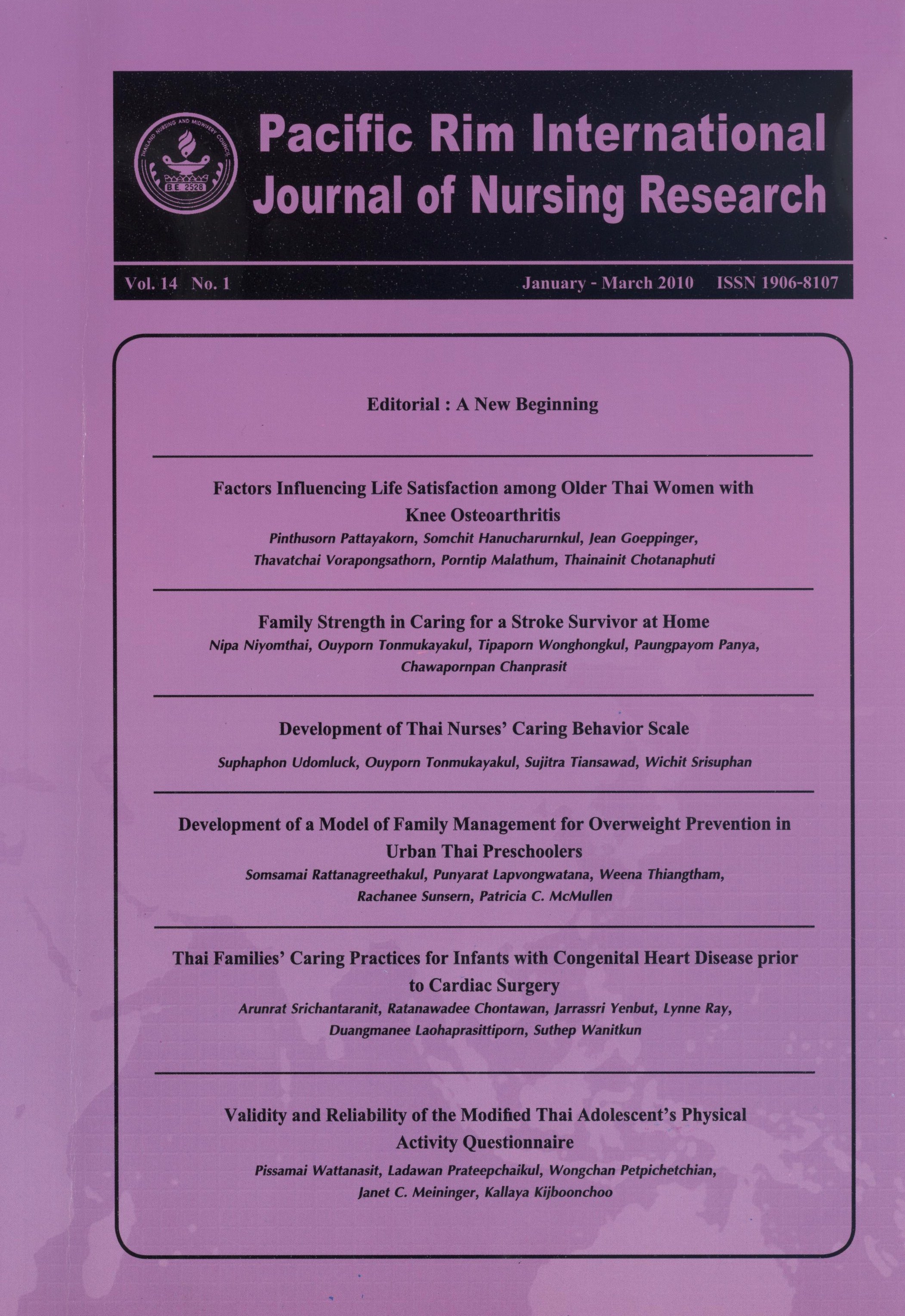Family Strength in Caring for a Stroke Survivor at Home
Keywords:
การดูแล, ความเข้มแข็งของครอบครัว, ปรากฏการณ์นิยมเฮอร์เมนนิวติก, การปรับเปลี่ยนของมนุษย์, Caregiving, Family strength, Hermeneutic phenomenology, Human becomingAbstract
บทคัดย่อ
การศึกษาปรากฎการณ์นิยมเฮอร์เมนนิวติกนี้ เพื่อศึกษาความหมายความเข้มแข็งของครอบครัวในการดูแลสมาชิกที่ป่วยด้วยโรคหลอดเลือดสมองที่บ้าน ความเข้มแข็งของครอบครัวเป็นศักยภาพของครอบครัวในการเผชิญกับเหตุการณ์ชีวิตที่ก่อให้เกิดความเครียดภายใต้มุมมองของกระบวนการปฏิสัมพันธ์ซึ่งกันและกันอย่างต่อเนื่องระหว่างมนุษย์กับสิ่งแวดล้อม โดยศึกษาจาก 6 ครอบครัว (สมาชิกในครอบครัวจำนวน 16 ราย) โดยคัดเลือกแบบเฉพาะเจาะจงและคัดกรองด้วยแบบสอบถามความเข้มแข็งของครอบครัว ซึ่งเป็นครอบครัวที่มีระดับความเข้มแข็งของครอบครัวสูง จำนวน 4 ครอบครัว และครอบครัวที่มีระดับความเข้มแข็งของครอบครัวปานกลาง จำนวน 2 ครอบครัว ข้อมูลได้จากการสัมภาษณ์เจาะลึก ร่วมกับการสังเกตและการจดบันทึกนำมาวิเคราะห์โดยใช้วิธีการวิเคราะห์เนื้อหาแบบธีมาทิคของบรานและคลาร์ก
ผลการวิจัยพบว่า ครอบครัวที่มีระดับความเข้มแข็งสูงแสดงถึงความพยายามของครอบครัวอย่างต่อเนื่อง เพื่อผ่านพ้นความยากลำบากจากการให้การดูแลด้วยความหวังเพื่อสมาชิกที่ป่วยด้วยโรคหลอดเลือดสมองมีชีวิตอยู่ได้นาน ส่วนครอบครัวที่มีระดับความเข้มแข็งปานกลางแสดงถึงความพยายามของครอบครัวที่จะผ่านพ้นความยากลำบากในระดับน้อยด้วยไม่มีหวังเพื่อสมาชิกที่ป่วยด้วยโรคหลอดเลือดสมองมีชีวิตอยู่ได้นาน นอกจากนี้ยังพบว่าสมาชิกผู้ดูแลหลักของครอบครัวที่มีระดับความเข้มแข็งสูงมีการพัฒนาบทบาทการดูแลของตนเองมากกว่าสมาชิกผู้ดูแลหลักของครอบครัวที่มีระดับความเข้มแข็งปานกลาง ครอบครัวที่มีระดับความเข้มแข็งสูงยังมีความรับผิดชอบร่วมกันในการดูแลและการงานของครอบครัว ขณะที่ครอบครัวที่มีระดับความเข้มแข็งของครอบครัวปานกลางขาดความร่วมมือกันทั้งภาระในการดูแลและการงานของครอบครัวอย่างชัดเจน ดังนั้น ความเข้มแข็งของครอบครัว เป็นปรากฏการณ์ที่เกิดขึ้นจากการผ่านพ้นความยากลำบากด้วยความหวังเพื่อให้สมาชิกที่ป่วยด้วยโรคหลอดเลือดสมองมีชีวิตอยู่ได้นาน การพัฒนาความสามารถของสมาชิกครอบครัวจากการสะสมประสบการณ์และการกำหนดความรับผิดชอบร่วมกันในการดูแลและการงานของครอบครัว
การคำนึงถึงมุมมองและความสามารถของครอบครัวในการดูแลสมาชิกที่ป่วยด้วยโรคหลอดเลือดสมองที่บ้านช่วยสร้างเสริมความเข้าใจของพยาบาลต่อประสบการณ์ครอบครัวที่มีวิวัฒนาการในการดูแลที่บ้านแตกต่างกัน นอกจากนี้ ความรู้นี้สามารถนำมาใช้ในปรับการปฏิบัติทางการพยาบาลเพื่อช่วยเหลือสนับสนุนครอบครัวต่อไป
คำสำคัญ: การดูแล; ความเข้มแข็งของครอบครัว; ปรากฏการณ์นิยมเฮอร์เมนนิวติก; การปรับเปลี่ยนของมนุษย์
Abstract
This hermeneutic phenomenological study explored the meaning of family strength when caring for a stroke member at home. Family strength is considered to be the competency of a family when faced with a stressful life event that can be viewed through a continuous man-environmental interaction process. Six family units were purposively recruited and screened using the Family Hardiness Index (four with high-level of hardiness, and two with moderate-level of hardiness). Data were collected through in-depth interviews, field observations and field notes, and analyzed using Braun and Clarke’s thematic analysis method.
Findings revealed families with high-hardiness continuously strove to overcome caregiving hardships and had hope for the stroke member’s long existence, while families with moderate-hardiness demonstrated less effort to overcome caregiving hardships and held no hope for the stroke member’s long existence. Primary caregivers among families with high-hardiness revealed more self-development in carer role than did those of families with moderate-hardiness. Families with high-hardiness shared caregiving and family task responsibilities, while families with moderate-hardiness lacked collaboration regarding caregiving and family tasks. In addition, family strength emerged from families overcoming caregiving hardships through: hope for the stroke member’s long existence; development, accumulated experiences of “can do” family members; and, establishment of shared caregiving and family task responsibilities.
Consideration of views and abilities of the family unit to provide homecare for a stroke member can enhance nurses’ understanding of different developmental experiences of home caregiving families. In addition, such knowledge can facilitate adoption of meaningful nursing interventions to support the families.
Keywords : Caregiving; Family strength; Hermeneutic phenomenology; Human becoming
Downloads
How to Cite
Issue
Section
License
Copyright: The Pacific Rim International Journal of Nursing Research, Thailand Nursing & Midwifery Council has exclusive rights to publish, reproduce and distribute the manuscript and all contents therein.







.png)


